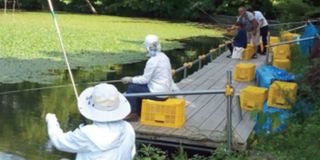How JICA Promotes Human Resource Development and Resolving Issues in Tanzania

Mr. Godfrey visited the community that conserves the lake and by doing so, they added value to the ecosystem (Ecosystem Value Addition). In Hokkaido Japan
Long History of JICA’s Training Program
Human resources development and resolving Issues to the developing countries remains one of the core activities of JICA (Japan International Cooperation Agency)‘s cooperation.
JICA’s training program to Tanzania has a long history. It was commenced sixty years ago in 1962, just one year after the independence of Tanganyika, with the acceptance of one Tanzanian for technical training in Japan. By August 2023 over 23,000 Tanzanians had benefitted from JICA training program conducted either in Japan, in third countries or within the country.
JICA Knowledge Co-Creation Program (KCCP)
Japan began its international cooperation in 1954, and “The Training Program in Japan” started in the same year by inviting sixteen participants from other parts of Asia. Up to 2014, the term “training” had been used for the program, however, to inspire the program with “cocreating” approach of Japan, a new program title “The Knowledge Co-Creation Program” has been used from 2015.
The term “co-creating” means the approach of building reciprocal relationships between Japan and the participating countries in which both sides learn from each other and develop together. The Knowledge Co-Creation Program.
The objective of JICA’s Knowledge Co-Creation Program is to contribute to human resource development to address and solve target issues and challenges in developing countries in various sectors: Agriculture, Industry, Infrastructure, Energy, Local Governance, Public Financial Management, Health, Water, Private Sector, etc.
It also aims to contribute to the promotion of mutual understanding and friendship. The knowledge and expertise that the participants acquire in Japan strengthen societies and economies and improve the lives of individuals in Tanzania.

Mr. Godfrey visited the community that conserves the lake and by doing so, they added value to the ecosystem (Ecosystem Value Addition). In Hokkaido Japan
Africa Business Education Initiative for Youth (ABE Initiative)
JICA provides also long-term training program include Africa Business Education Initiative for Youth (ABE Initiative). The ABE Initiative is a program that offers opportunities for African youths to study at master’s courses at Japanese universities as international students and to experience internships at Japanese companies. It aims to foster young personnel who can contribute to the development of industries in Africa as well as to be a “navigator” for Japanese firms’ operations in Africa.
Through the ABE Initiative over 107 Tanzanians have so far participated in various master’s degree program in Japan. The program aims at developing youth who can contribute to the development of industries in Africa as well as to be “navigators” for Japanese firms which need operations in Africa.
A participant from the Tanzania Private Sector Foundation (TPSF), Ms. Abella DENIS who went for a Masters’ Degree Program on International Development Program (IDP) had this to say: “I will use the knowledge acquired from Japan both from studies and internship to strengthen the cooperation between the two countries through different works in industries, governance and private sector community so as to contribute to the development of Tanzania”.

Send-off ceremony for ABE Initiative participants.
The Social Contribution Activities by Ex-Participants in Tanzania
After returning to their home countries, ex-participants of JICA’s training program continue to utilize their experiences and knowledges gained in Japan to contribute to address social issues in a variety of sectors.
JICA is also supporting various ex-participants’ social contribution activities, and one of the activities is called HATUA project. HATUA is an acronym that stands for “Project for Highlighting Action-plans from Training-program Utilizing Authentic ideas”, aiming to utilize skills, knowledge and experience gained in Japan through JICA training program.
Mr. Godfrey Gabriel CHRISTOPHER, a Principal Fisheries Technical Tutor at Fisheries Education and Training Agency (FETA), had participated in the JICA KCCP program “VALUE CHAIN DEVELOPMENT FOR SUSTAINABLE USE OF FISHERIES RESOURCES” in 2019 for 2 months by JICA Hokkaido in Japan, and implemented a HATUA project in Jibondo Island, Mafia district.
Talking about his Japanese experience he said: “Through the JICA training in Japan, I have been able to adopt practical approaches, such as adaptive control of the fishing pressure with value chain development of unutilized resources. Moreover, I have been able to obtain a support from JICA after coming back to Tanzania to capacitate seaweed farmers in Jibondo Island to add value to their cultivated seaweed by producing value-added products including soap, skin jelly, lotion, shampoo, shower gel and food products such as cakes, pans, juice, etc., made from local seaweed”.
His future plan is to champion the production of seaweed value added products in Tanzania by working together with the seaweed farmers in Mafia Island and register the value -added products with the Tanzania Bureau of Standards (TBS) with the intention to selling such products at domestic, regional and international markets in large quantities.

Value-added seaweed training in Jibondo Island.
Bridges between Japan and Tanzania
The JICA Alumni Association of Tanzania (JATA) is an association which brings together all ex-participants of JICA’s Training program. Founded in 1984, it now boasts of a membership of over 4,087 members. The latest JATA Annual General Meeting (AGM) was held on March 8, 2024, and several activities of JICA ex-participants to address the social issues in Tanzania were highlighted.
Speaking at the AGM, the Chief Representative of JICA Tanzania, Mr. ARA Hitoshi, reaffirmed the long history of JICA’s cooperation to Tanzania and emphasized on the importance of partnerships with JICA ex-participants and implored upon them to continue acting as bridges between Japan and Tanzania. He also reaffirmed JICA’s total commitment towards supporting Tanzania’s development efforts through Training Program offered by JICA.

Mr. Godfrey was awarded a certificate of HATUA project by Chief Representative of JICA Tanzania, Mr. ARA Hitoshi at JATA AGM.
70th Anniversary of Japan’s Official Development Assistance (ODA)
The year 2024 is a very significant year for Japan and for the developing world. This is because the year marks the 70th anniversary of Japan’s Official Development Assistance (ODA) to developing countries. Over the course of the 70 years, Japan has contributed to addressing a wide range of local and international issues as a responsible member of the international community. In concrete terms over those years, Japan has provided support to over 190 countries and regions.
We celebrate the 70th anniversary of Japan’s ODA, we in JICA Tanzania are proud for having been part of it by providing assistance to the country aimed at supporting the self-help efforts of the people to improve their livelihoods through Training Program, while respecting their ownership.
ICA Tanzania Office,
3rd Floor, ABSA House 1008/1
Ohio Street,
P.O. Box 9450, Dar es Salaam
Tel:022-2113730/2117334
JICA Tanzania Website JICA Tanzania FB


